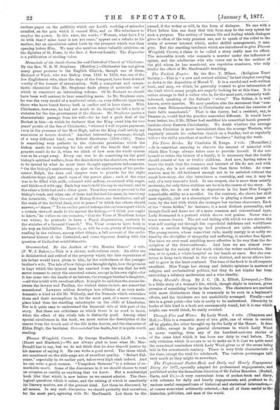The Three Brides. By Charlotte M. Yonge. 2 vols. (Macmillan.)
—It is somewhat amusing to observe the amount of material with which Miss Yonge always takes care to provide herself. If she sets herself to relate the history of a family, it is necessary that the family should consist of ten or twelve children. And now, having taken to- heart the truth that the romance and interest of life do not end with marriage, she is not content with less than three brides. As some readers may be old-fashioned enough not to be satisfied without the usual love-story, she also introduces a courtship, and one, it may be said, of a very romantic kind. In one respect, she is more than usually moderate, for only three children are born in the course of the story. In saying this, we do not wish to depreciate in the least Miss Yonge's remarkable ability as a novelist. On the contrary, she shows her skill most signally, just as a chessplayer who is playing a dozen games at once, by the tact with which she manages her various characters. Each of the "three brides," for instance, is a most distinct personality, and though Cecil and Anne are of a more common and conventional type,. Lady Rosamond is a portrait which shows real genius. Never was a truer woman drawn. The art and feeling with which we are shown the true self coming out through the superficial indolence and worldliness which a careless bringing-up had produced are quite admirable. The young curate, whose somewhat rude, manly energy is so nobly re- fined by the discipline of sympathy and suffering, is another fine figure. Nor have we ever read anything more effective in its way than the de- scription of the fever-outbreak. And here we are almost over- whelmed by the variety of the work which the writer undertakes. She has, so to speak, a whole hospital on her hands at once. But she con- trives to keep each thread in the story distinct, and never allows her- self to grow in the least confused. The tone of the book is in all respects excellent. Miss Yonge has strong and definite opinions in matters of religion and ecclesiastical politics, but they do not hinder her from exercising a salutary moderation and a wise charity.









































 Previous page
Previous page